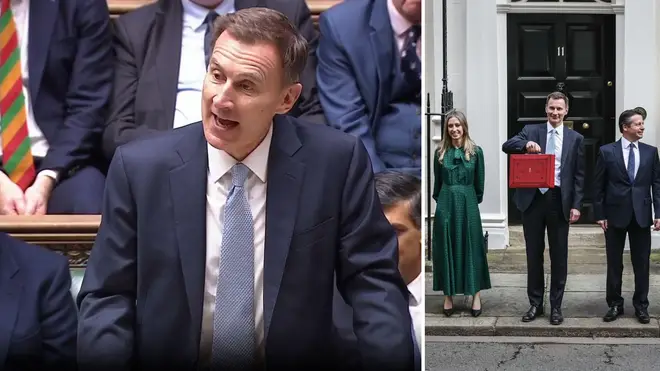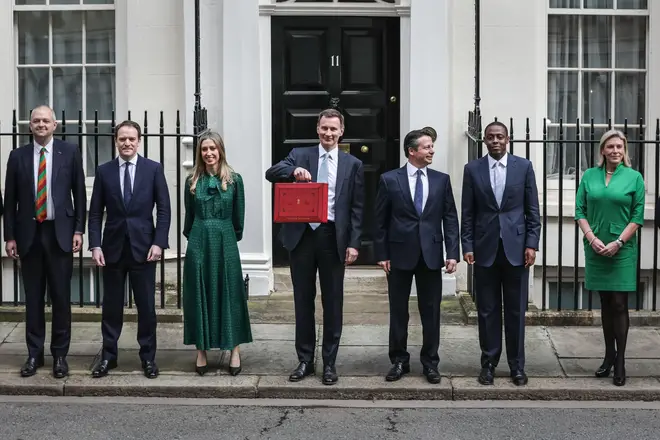
Rachel Johnson 7pm - 10pm
6 March 2024, 13:43 | Updated: 6 March 2024, 16:31

Chancellor Jeremy Hunt has announced a £450 boost for millions of workers and more help for parents in his Budget for 2024 - but there will be a crackdown on landlords, non-doms, vapers and smokers.
Mr Hunt said he will reduce the rate of National Insurance Contributions by a further 2p, worth around £450 a year for someone on an average salary. He framed it as a tax cut of £900 given earlier NI changes made in the Autumn.
The Chancellor said he wanted to end the “unfair.. double taxation” of people’s earnings.
"Countries with lower taxes generally have higher growth," he said.

'I told the Chancellor: 'You're going into an election, this is actually what's annoying people'
He also announced that earners on up to £80,000 will get child benefit, rather than the £60,000 where it currently stands. Fuel duty is being frozen for the 14th year, and alcohol will also continue to be held for another six months.
Mr Hunt further announced a crackdown on non-doms, vapers and smokers and curbed tax breaks for landlords.
He said that the current tax system for non-doms, which allowed some wealthy individuals to avoid paying tax on their foreign income, will be abolished in a measure expected to raise £2.7bn.
Under the plans today the average price of a packet of 20 cigarettes is set to soar past £16 for the first time.
Vapes are also being targeted in a bid to reduce the rate of underage vaping.
Before the tax increase the mean cost of a packet of 20 stood at £15.26 in January, according to the Office for National Statistics.
He said he is cutting National Insurance by 2p in a measure that was widely expected.

Read more: Jeremy Hunt commits to free childcare pledge despite funding fears
The Chancellor said: "From April 6th, employees National Insurance will be cut by another 2p, from 10% to 8%. And self-employed national insurance will be cut from 8% to 6%.
“It means an additional £450 a year for the average employee or £350 for someone self-employed.
“When combined with the autumn reductions, it means 27 million employees will get an average tax cut of £900 a year and 2 million self-employed a tax cut averaging £650. Changes that make our system simpler and fairer. And changes that grow our economy by rewarding work.”
But Sir Keir Stamer said the Tories had ‘left the country in tatters’.
He said the Tories have put the nation into “a vicious downward spiral".
"Five more years and it will only get worse," the Labour leader said. He said the UK “deserves a government ready to take tough decisions".
He said despite the Chancellor’s announcement, taxes remain ‘at a 70-year high' and that this represents “an unprecedented hit to living standards for working people.”

James O'Brien reacts to Jeremy Hunt's promotional video ahead of Budget
Former chancellor Phillip Hammond said that the budget addresses the country’s need for a “productivity revolution”.
He told LBC: “There are two ways of getting debt to GDP down – one is to pay off debt and the other is to increase GDP - and of course by far the more satisfactory way is to increase GDP, but in order to do that we've got to have a productivity revolution in this country.
“Our productivity performance is abysmal. It's always been quite poor, but it's got much worse since 2008 and I think Jeremy Hunt’s budget today recognises that and focuses what capacity has on trying to encourage British workers of working age back into the workforce, and those that are already in the workforce to maybe work more hours by cutting their marginal tax rates by a bit.”
Mr Hunt said the way people's income is taxed is "particularly unfair", adding: "If you get your income from having a job, you pay two types of tax - national insurance contributions and income tax.
"If you get it from other sources you only pay one. This double taxation of work is unfair. The result is a complicated system that penalises work instead of encouraging it.
"If we are to build a high wage, high skill economy not dependent on migration, if we want to encourage people not in work to come back to work, we need a simpler, fairer tax system that makes work pay.
"That's why I cut national insurance contributions in the autumn."
He added: "Today, because of the progress we have made bringing down inflation, because of the additional investment that is now flowing into the economy, because we have a plan for better and more efficient public services, and because we have asked those with the broadest shoulders to pay a bit more, I go further."
"From April 6, employee national insurance will be cut by another 2p, from 10% to 8%, and self-employed national insurance will be cut from 8% to 6%.
"It means an additional £450 a year for the average employee or £350 for someone self-employed. When combined with the autumn reductions, it means 27 million employees will get an average tax cut of £900 a year and two million self-employed a tax cut averaging £650."
The Chancellor concluded: "It is to unleash that people power that we have today put this country back on the path to lower taxes. A plan to grow the economy versus no plan.
"A plan for better public services versus no plan. A plan to make work pay versus no plan.
"Growth up, jobs up and taxes down."
National Insurance is paid by people between age 16 and state pension age who are either an employee earning more than £242 per week from one job or self-employed and making a profit of more than £12,570 a year.
The Treasury said the NI cut would save an average self-employed person on £28,000 £650 a year. An average full-time nurse on £38,900 will be better off by £1,053, the Treasury said. A typical junior doctor on £65,000 will be better off by £1,508.